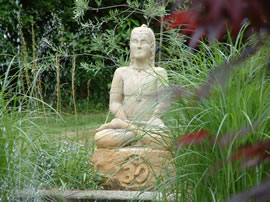How does a spiritual person speak, sit and walk. – Helen Hyson
In Chapter two of the Bhagvad Gita Krishna encourages Arjuna to follow the spiritual path:“That man attains Peace who lives devoid of longing, freed from all desires and without the feeling of ‘I’ and ‘mine’.” (V,71)
Most of us live a life which is far removed from the spiritual path. We may have high ideals, aspire to follow a moral and ethical code of conduct, but our actions are often a response to sensual desire. The desire to study and gain some insight into the philosophy of the Gita is undermined by the more worldly pleasures of talking with friends, drinking tea and relaxing in front of the TV. Yes the dog did need to be taken for a walk, but when the ironing became an unusually attractive proposition, even ‘I’ could recognise the subconscious mind creating an avoidance strategy! How can I dislike ironing one minute and want to do it the next? Some of the clothes are Dave’s. Should I iron his shirts? Who is the ‘I’ that has been become so involved in this emotional tangle? When viewed as a domestic task to be done or not as circumstances dictate, the sense of ‘I’ disappears.
A spiritually minded person would simply get on with the ironing to the best of their ability, without any trace of an emotional response;
“The one fixed in equanimity of mind frees oneself in this life from virtue and vice alike; therefore devote yourself to yoga; work done to perfection is verily yoga..” (V, 50).
Sending the ironing to one of these agencies that do all the hard work for you seems a very tempting prospect. The existence of such a service to the community is admirable, but not an example of Karma Yoga, as the acquisition of money motivates the action.
“Seek to perform your duty; but lay not claim to its fruits.”
(V, 47).
Iron the shirts if they are there to be ironed, but do not iron Dave’s shirts in the expectation of some expression of love and appreciation, claiming that it is a spiritual act.
“Be you not the producer of the fruits of Karma: neither shall you lean towards inaction.(V,47).”
As a youngster I ploughed an enormous heap of family ironing, thinking that my Mother would be pleased with my efforts and value my newly acquired skills. With pride I showed her the neatly folded results and was disappointed to find that she viewed the whole process as a waste of time and effort. The fact that I had a skill which could be used in service to the family was really all that mattered.
So how should a spiritual person speak? Speech which boasts of personal achievements and steals others time in listening, is full of ego. A spiritual person has control over his senses, does not need to engage in such conversation. It is pleasant to meet with friends, but on days when I have enjoyed the luxury of solitude the increased levels of energy have been significant. A pond where the wind makes constant waves can never by calm.
“There is no wisdom in the fickle-minded; nor is there meditation in him. To the unmeditative there is no peace. And how can peaceless enjoy happiness?” (V,66)
When first joining Social Services as a teacher it seemed impossible to find peace of mind within such an environment. The young people seemed hostile and negative, the task of accessing education impossible given the circumstances of their background. The ethical questions raised lead me to attend a course on Buddhism, in the hope of finding some guidance. A nun offered the advice:
“If you can’t stand the heat get out of the kitchen!”
This at least made me determined to stick with the situation and look a little deeper. Realising that here was a connection between thought and our perceptions of reality. Discerning positive qualities within the young people I worked with and accepting that my own fear could be inviting abuse began to bring changes in working practice. Six years on there are still many issues of concern, but the young people I work with have been good teachers and the relationship has been to our mutual benefit. Even within such an emotional maelstrom it has been possible for us to experience peace.
“In tranquillity, all his sorrow is destroyed. For the intellect of the tranquil-minded is soon anchored in equilibrium” (V,65)
How then can spiritual progress come to that point of stillness where there is no longer the need to become involved in worldly action? The identification with the senses leads us to be involved with the worldly objects of the senses, we are attached to friends, family, social position and wealth. When we realise that no lasting happiness can be gained from this Karma of earthly existence, then desires disappear we look within to discover the true nature of Atman.
“When a man abandons, O Partha, all the desires of the heart and is satisfied in the Self by the Self, then is he said to be stable in wisdom.” (V,55)
If the mind can become this tranquil then we can exercise true discrimination. Even then it requires great effort to maintain this progress.
“The excited senses, O son of Kunti, impetuously carry away the mind of even a wise man, striving for perfection.” (V,60)
As one who very much feels the pain in the knees when sitting and has great difficulty in viewing pain with dispassion, the later part of this essay can only be viewed in theory. However, the journey ahead holds great interest!
**********************************
Sri Swami Chidbhavananda Ji writes in his book ‘Bhagavad Gita’ under ‘Introduction,p.35’:-
